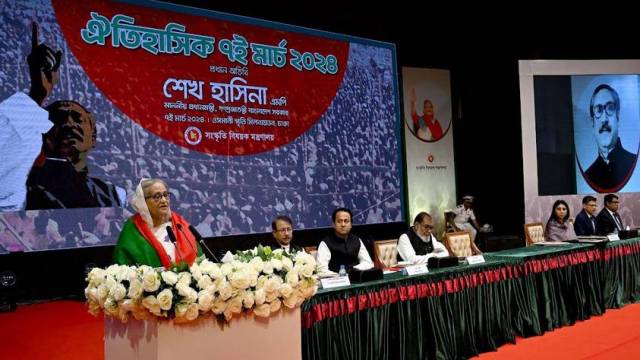 Daily Star Banner
Daily Star Banner

Explaining the greatness of the historic 7 March Speech of Father of the Nation Bangabandhu Sheikh Mujibur Rahman, Prime Minister Sheikh Hasina said that this speech not only inspired the people and prepared them for a guerilla war but also has brought independence for the nation.
"A speech by a leader (Bangabandhu Sheikh Mujibur Rahman) not only inspired the people, prepared for a guerilla war, but also brought victory in a war. That was the most important thing," she said.
The premier made this remark while addressing a function organized by the Ministry of Cultural Affairs on the occasion of the "Historic 7 March-2024" in the city's Osmani Memorial Auditorium.
She said that the Pakistanis spent their time to find out the meaning and explanation of this speech.
"They (Pakistanis) tried to search the answer (of the speech); what he (Bangabandhu) said, and what happened. The people of Bangladesh throng down with arms and fought ... that was their (Pakistanis) statement.
To this end, Sheikh Hasina mentioned that they (Pakistanis) picked up many journalists and others to the then West Pakistan to get the answer of the historic 7 March Speech.
The Prime Minister said that the Historical 7 March Speech of the Father of the Nation has now been recognized as the top speech of the world that encouraged people towards liberation, although the anti-liberation forces repeatedly tried to erase it from the history.
"History can't be erased, truth cannot be kept hidden by falsehood, and now that is proved," she said.
Sheikh Hasina said that this speech has taken place as the greatest speech in the world history where the leaders through their speeches encouraged people for independence.
"They (anti-Liberation forces) erased the name of the Father of the Nation, his picture was not shown, the historical 7 March Speech was banned, Joy Bangla slogan was banned," she said.
Recalling the barbaric killing of the Father of the Nation, Sheikh Hasina, also the eldest child of Bangabandhu, said that the anti-liberation forces didn't like the efforts of Bangabandhu after the independence as he pulled the country to the least developed country within three years and seven months from the war ravaged one.
"And when the country was advancing towards economic emancipation, the anti-liberation forces didn't like it," she said.
The Premier said that the most regrettable matter is that the Pakistanis couldn't kill the Father of the Nation, but the people of the country emerged as the killers. "It was not just a killing for power, they did not kill only the President," she said.
In this connection, she mentioned that her mother, three younger brothers, only paternal uncle, student leader Fazlul Haque Moni and his pregnant wife, her uncle Abdur Rab Serniabat and his ten year-old son, 13- year old daughter, and four-year-old grandson were also killed.
She also said that Bangabandhu's military secretary who rushed to save him was also killed alongside Police officer Siddiqur Rahman.
"Bangladesh couldn't advance for a single step after this huge bloodshed. Bangladesh was totally stuck, there was no socioeconomic advancement while there was no change in the fate of the people," she added.
With State Minister for Cultural Affairs Naheed Ezaher Khan in the chair, Secretary of the Ministry Khalil Ahmed delivered the address of welcome.
Liberation War Affairs Minister A K M Mozammel Huq, Education Minister Mohibul Hassan Chowdhury, PM's Education and Cultural Affairs Adviser Dr Kamal Abdul Naser Chowdhury and Cabinet Secretary Md Mahbub Hossain also spoke.
At the outset, the historic 7 March speech of Father of the Nation Bangabandhu Sheikh Mujibur Rahman was played.
